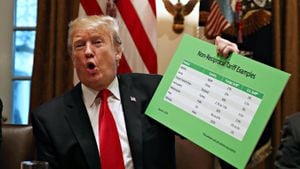Billionaire entrepreneur Elon Musk has been bestowed with the notable role of co-leading the newly formed Department of Government Efficiency under President-elect Donald Trump. This announcement stirred discussions, not just about the potential restructuring of government departments, but also about the underlying motivations and expected outcomes of this collaboration between business leaders and the political sphere.
Trump, announcing the initiative via social media, praised Musk and former Republican presidential candidate Vivek Ramaswamy for their vision to "dismantle government bureaucracy, slash excess regulations, cut wasteful expenditures, and restructure federal agencies." It's hard to ignore the irony of Musk, known for his disruptive business practices, stepping onto the political stage to advocate for government efficiency. But could this collaboration yield real reform, or is it yet another chapter in the theater of modern politics?
At the crux of Musk's engagement with Trump's administration is his bold proclamation during one of Trump’s rallies, where he suggested the U.S. government could, and should, cut its yearly budget by at least $2 trillion—a staggering claim considering the nation's budget hovers around $6.5 trillion. Over the years, Musk has leveled frequent criticisms of government regulation, asserting they stifle innovation and progress. But what does his ascension to this role actually mean for federal oversight and the operational structure of government?
Opponents of Musk's appointment argue it raises significant conflicts of interest. Musk's interests are deeply intertwined with government contracts through firms like SpaceX and Tesla, both of which rely heavily on federal regulations, funding, and oversight. With SpaceX holding contracts worth over $8 billion with the government, the suggestion of legislation aimed at regulatory reduction could lead to beneficial outcomes for Musk's companies, raising concerns about self-serving motives hidden behind the guise of efficiency.
Experts like Christopher Phelps from the University of Leicester have warned about the dubious nature of Musk’s motives. "I think putting someone who is such a billionaire and runs major corporations at the helm of deregulation is innately full of conflicts of interest," Phelps notes. Musk is seen by some as genuinely committed to the cause of reducing government intrusiveness, but the potential for his corporate interests to benefit directly from the policies he advocates is not something to be dismissed lightly.
Sharing similar aspirations, Ramaswamy has advocated for the elimination of several federal agencies—including the Department of Education and the IRS—which would fundamentally reshape the way governmental functions are organized and operate. His vision aligns with Trump's own campaign rhetoric aimed at dismantling what he terms the "deep state," which he perceives as the entrenched bureaucratic apparatus stifling effective governance.
Yet, it’s important to interrogate the feasibility of this ambitious agenda. Critics argue the proposed cuts and restructuring could have catastrophic consequences. For example, Musk himself has acknowledged such changes would likely necessitate "temporary hardship" for the American populace. Experts have reiterated this concern, pointing to the potential fallout from massive cuts to social programs relied upon by millions of Americans. Sharon Parrott, president of the Center on Budget and Policy Priorities, succinctly explains the challenges, "You can’t get to cuts of the size they’ve been throwing around without gutting things people really care about and count on.” Such cuts could devastate programs focused on health, education, and welfare—all foundational elements of social support for countless citizens.
The skepticism surrounding the efficacy of the newly minted Department of Government Efficiency is compounded by its nebulous structure. Unlike traditional departments established through congressional action, Trump's initiative appears to function as an advisory commission, with limited authority over actual implementation of policy changes. By labeling it as "DOGE"—a playful nod to the popular meme cryptocurrency associated with Musk—Trump might have inadvertently painted this initiative as unserious. Yet, beneath this superficial layer of humor lies the intent to initiate substantial governmental changes.
On the campaign trail, Musk repeatedly emphasized the country’s ability to optimize its governmental operations, framing his mission as mission-critical for humanity’s long-term survival aspirations—including his goal to colonize Mars. He argues the achievements of such grand endeavors are only possible if government processes are streamlined and freed from excessive oversight. This type of rhetoric appeals to both his supporters and those who advocate for more libertarian governance, where autonomy from government control is celebrated as the ultimate form of freedom.
Transitioning to the contemporary political climate, Musk's involvement signals a broader trend where business leaders wield significant influence over public policy, raising pertinent questions about the intersection of capitalism and state governance. With Trump's administration likely to lean significantly on business-minded approaches to steering public policy, the role of societal checks on such influences becomes ever more pressing.
The political fallout of Musk's appointment remains murky, as reactions from various segments of the population are mixed, oscillation between enthusiasm for potential government reform and trepidation about the ramifications of unchecked financial power. This dynamic emphasizes the need for careful scrutiny of decisions bolstered by corporate interests and their transformational impact on public service.
While proponents of deregulation champion Musk's rise as heralding new opportunities for innovation and economic efficiency, others fear repercussions unfurling as social safety nets become increasingly strained under the weight of fiscal cutbacks.
Looking to the future, the Department of Government Efficiency under Musk and Ramaswamy will attract attention, as they carve out their vision of government reform. The outcomes of their proposals will be pivotal for government efficiency discourse, sparking debates about the necessity and feasibility of such comprehensive cuts.
Only time will reveal if Musk's ability to navigate arcane bureaucracies proves successful or whether his business empire's ethos translates effectively to government operations. Will the proposed structural reform yield genuine change, or will it be merely another iteration of corporate tradition masquerading as political innovation? The stakes are high and the American people are right to remain engaged as these developments unfurl.



